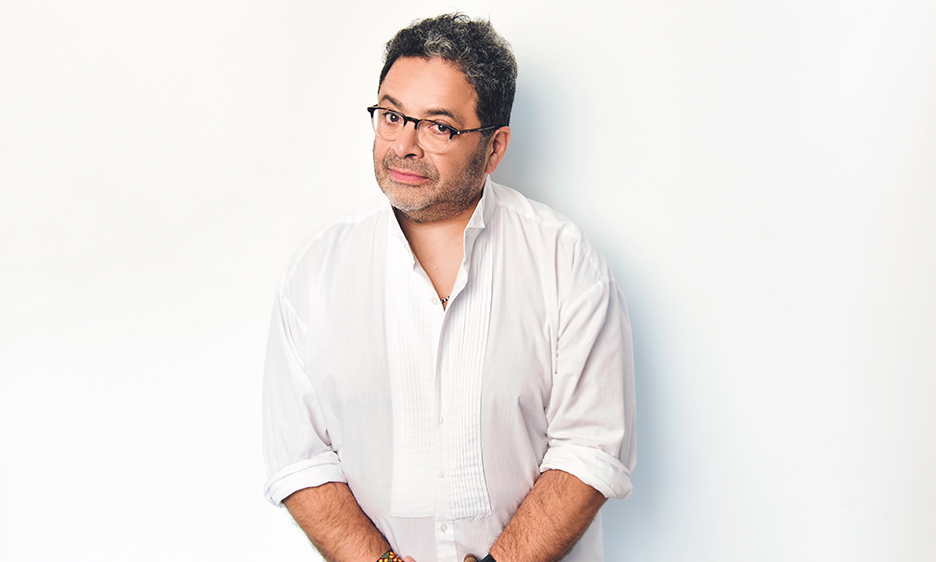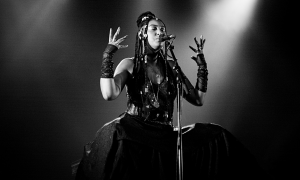Home » Jazz Articles » Inside The Interview » Arturo OЎҜFarrill: The Arts Belong to the People
Arturo OЎҜFarrill: The Arts Belong to the People

Write honestly from deep within your soulЎӘnot to please critics or win awards.
—Arturo O'Farrill
Arturo O'Farrill
pianob.1960
"I love San Francisco! I lived in San Francisco decades ago, I want to say 1982 through 84, 85," O'Farrill says. "I've just been circling that beloved city my whole life... I have a deep reverence for San Francisco."
He's arriving with a renewed physical and artistic approach to his primary instrument. "I think I'm playing the piano somewhat competently for the first time in my life," he offers, laughing at the audacity and the truth of it. "There's a level of relaxation you need to achieve at the keyboard... to connect improvisational thought with immediate musical response; truly, it cannot be hindered." Too much Afro-Latin piano, he argues, is "fast, flashy, and driven." His counter-practice is elemental: "I'm discovering that relaxing at the piano is like letting your hands turn into water and flow through the keys, which is different from manhandling them... I'm just starting to play at the peak of my power."
That image—hands as water—points straight to Mundoagua and to the artist who shaped O'Farrill's ear from the start: composer

Carla Bley
piano1938 - 2023
Bley's mischievous streak was just as influential. "Carla also showed me the possibility of humor in jazz... She loved to laugh and enjoyed hearing others laugh," O'Farrill recalls, launching into a tour-bus memory. After a stretch of free-jazz notoriety, Bley turned up at a European concert with rock songs. (In 1979, she'd recorded Fictitious Sports with

Pink Floyd
band / ensemble / orchestrab.1964
"People started yelling and screaming and getting really uptight and angry because they wanted to hear the free-jazz Carla," O'Farrill said. "She turned around and ripped out a piece called 'Boo To You, Too... ' and proceeded to win over this hardcore European free-jazz audience with humor." The takeaway was permanent: "The most important thing you can do is touch people."
Touching people is the charge behind Mundoagua and O'Farrill's pairing of its title work with Carla Bley's final commission, "Palestine Blue." "If it weren't for Carla, I wouldn't be the composer, pianist, or bandleader I am today," he says. "I had the privilege of commissioning 'Palestine Blue.' And I think Mundoagua is one of the most comprehensive compositions of my life... one that best reflects Carla's curiosity, honesty, and integrity." He's unsentimental about outcomes: "No, it's not going to get a lot of airplay... but it is deeply honest work... So, I paired them together as a way of saying, thank you, Carla. I have taken your muse, and I'm moving forward with it with all my soul."
Within Mundoagua, the writing moves from lyric stillness to orchestral pressure. "Carla could write very sweetly, and the first movement is almost pastoral... it describes the state of waters and glaciers and lakes," he explained. "And we're messing it up. We're destroying it." The third movement turns outward, toward policy and conflict. "I took... the politics of water and really mixed in the sounds of conflict and the 'Star-Spangled Banner... ' the real internal contradiction that we have from our elected officials today who proclaim to be protectors of all people, but are actually... people whose lobbyists have paid for their mansions." The piece refuses to flatter. It insists.
Bley's "Blue Palestine" (as O'Farrill performed and discusses it) holds a different kind of refusal: curiosity as rebellion. "This was long, long before the political unrest that we have in the Middle East," he said. "She said to me, 'Do you mind if I experiment with Middle Eastern and South Asian modalities?' And all I could think of was, 'Carla, you're Carla Bley... you can do anything you want!'" One moment from the third movement remains inexhaustible: "

Patricia Brennan
vibraphoneO'Farrill's next large-scale statement, the opera Lucero, also steps into contested territory. "I remember the incident in 2008 where an Ecuadorian immigrant was killed coming home from his job by a group of teenagers in Long Island," he says. The story was a door into something structural. "It's really about that age-old behavior of blaming a marginalized people for a societal ill... The opera is so beautiful because it's not about the hate crime. It's about asking all of us to search our hearts and look at what role we play in allowing this kind of behavior."
His musical world is kaleidoscopic: "A contemporary chamber orchestra with avant-garde textures... I steal liberally from Olivier Messiaen... beautiful sections which reflect the folk music of Ecuador... and very clear, commercially American music that reflects the value system there." He grins when he reveals Act II: "The middle act is a conference table where a group of bankers are going, 'What do we do? We're about to fail big time... Why don't we bundle all these notes and sell them to Bank B?'" As for where you might see it: "I'm looking for partners... very likely premiering in Mexico City... in discussion with Houston and Detroit and exploratory conversations with the Met. But really, it would be wonderful to have a premiere in San Francisco."
Writing for opera has re-tuned his discipline. "One of the most beautiful experiences of my life was having to subject my composition to narrative," he says. "This time... the narrative became even more important than my musical yearnings. That's wonderful because... I was able to write real opera, but still sound distinctly Arturo." He remembers a similar response to his Carmen score for San Francisco Ballet: "People kept coming up to me and saying, 'You really can write ballet music'—but unbelievably, it sounds just like what you do with the Afro Latin Jazz Orchestra."
His organizing life is just as musical. Through his nonprofit BelongЁ®, O'Farrill is building Casa BelongЁ® in East Harlem, modeled on Havana's Fabrica de Arte. "It's really a center of energy, light, color, beauty, grace, and community," he says. "I don't like the word invite. I don't like the word include. I like the word belong because all culture belongs to people... The arts belong to the people." The planned facility is expansive: "350 seats, a state-of-the-art theater, practice rooms, classrooms, a community cafЁҰ, a little jazz club, a community conference room... and whatever concerts we play there have to have a space where people can see the music for free."
For O'Farrill, Afro-Latin jazz isn't a lane—it's the connective tissue of the hemisphere. "If you treasure culture, love, and communication above all else, you will change the physical course of history," he says. "It's not about playing mambos... It's about reintroducing Mother Africa to the fabric of contemporary jazz." The point is lineage, not labels: "If you listen to Mundoagua... you'll hear congas and shekeres... but it's not a mambo, that's for sure. It's music born of the same spirit that

Duke Ellington
piano1899 - 1974

Chico O'Farrill
composer / conductor1921 - 2001
That spirit is what he's bringing to SFJAZZ. "There will be surprises!" he promises. "I'm probably going to compose something crazy for that engagement." He lights up when he talks about the band. "

Ivan Renta
saxophoneb.1980
If you want the full experience, you need to be in the room. O'Farrill's upcoming SFJAZZ date is a chance to witness how his octet makes a theater feel like a circle. Bring your energy, he says, and expect it to be put to good use. "Come into the room and pretend there's no stage," he urges. "Imagine that we direct our energy into the center of the room... The spectator and the participant are not two of a kind. They're one and the same. They bring the most important ingredient to the performance... If we all focus on the co-mingling of our spirits in the center of the room, we will forget who we are, what we are, and what we're doing, and we'll experience community."
Arturo O'Farrill & the Afro-Latin Jazz Ensemble appear at SFJAZZ's Miner Auditorium—an ideal setting for this communion of melody and purpose.
"The arts belong to the people," O'Farrill repeats, the line landing like a credo and an invitation. "From one corner of the street to the other... we're going to build a place—and a sound—where everyone belongs."
Tags
Interview
Steven Roby
Arturo O'Farrill
SFJAZZ
carla bley
Patricia Brennan
duke ellington
Chico O'Farrill
ivan renta
Comments
PREVIOUS / NEXT
Arturo O'Farrill Concerts
Sep
19
Fri
Jazz Room Presents: Arturo O’farrill Latin Jazz
The Jazz Room At The Stage Door TheaterCharlotte, NC
Sep
20
Sat
Jazz Room Presents: Arturo O’farrill Latin Jazz
The Jazz Room At The Stage Door TheaterCharlotte, NC
Oct
4
Sat

Arturo O'Farrill and the Afro Latin Ensemble
California Center For The Arts, EscondidoEscondido, CA
Oct
9
Thu

Arturo O'farrill & The Afro Latin Jazz Orchestra.
ShapeShifter PlusBrooklyn, NY
Oct
10
Fri

Arturo O'farrill & The Afro Latin Jazz Orchestra.
ShapeShifter PlusBrooklyn, NY
Nov
14
Fri
Ephrat Asherie Dance With Arturo O'Farrill
Zellerbach TheatrePhiladelphia, PA
Nov
15
Sat
Ephrat Asherie Dance With Arturo O'Farrill
Zellerbach TheatrePhiladelphia, PA
Support All About Jazz
 All About Jazz has been a pillar of jazz since 1995, championing it as an art form and, more importantly, supporting the musicians who make it. Our enduring commitment has made "AAJ" one of the most culturally important websites of its kind, read by hundreds of thousands of fans, musicians and industry figures every month.
All About Jazz has been a pillar of jazz since 1995, championing it as an art form and, more importantly, supporting the musicians who make it. Our enduring commitment has made "AAJ" one of the most culturally important websites of its kind, read by hundreds of thousands of fans, musicians and industry figures every month.
Go Ad Free!
To maintain our platform while developing new means to foster jazz discovery and connectivity, we need your help. You can become a sustaining member for as little as $20 and in return, we'll immediately hide those pesky ads plus provide access to future articles for a full year. This winning combination vastly improves your AAJ experience and allow us to vigorously build on the pioneering work we first started in 1995. So enjoy an ad-free AAJ experience and help us remain a positive beacon for jazz by making a donation today.

San Francisco
Concert Guide | Venue Guide | Local Businesses
| More...






 Buy Now
Buy Now























